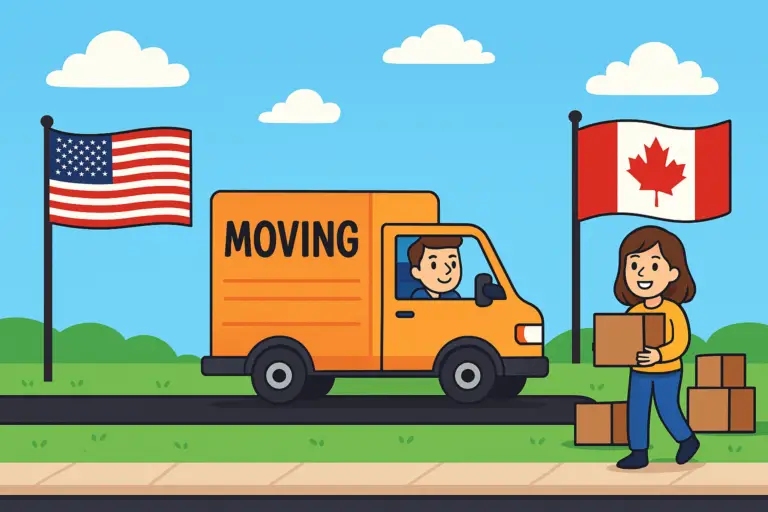Moving Abroad: A Complete Guide to Starting Your International Journey
Moving Abroad: Your Complete Guide to International Relocation Success
This comprehensive guide will walk you through every aspect of planning and executing an international move. From the initial spark of inspiration to settling into your new life abroad, we’ll cover practical advice, insider tips, and expert insights to help you make your international relocation dreams a reality. Whether you’re considering a temporary adventure or a permanent life change, this article will provide you with the roadmap you need to move abroad successfully.
Understanding Your Motivation: Why Move Abroad?
Before diving into the logistics of international relocation, it’s crucial to understand your personal motivations. Moving abroad is a significant life decision that affects every aspect of your daily routine, relationships, and future plans. Some people are drawn by career advancement opportunities in emerging markets, while others seek the adventure of experiencing new cultures firsthand.
Career-driven relocations often offer the most structured path abroad. Multinational companies frequently sponsor employee transfers, handling visa paperwork and providing relocation assistance. These opportunities can fast-track your international experience while maintaining job security. However, they may limit your destination choices and timeline flexibility.
“The biggest mistake I see people make is moving abroad without a clear purpose,” says Maria Rodriguez, an international relocation consultant with 15 years of experience. “Those who succeed have specific goals – whether it’s learning a language, advancing their career, or building a particular lifestyle. Having that north star makes all the challenges worthwhile.”
Personal relationships also drive many international moves. Love knows no borders, and countless individuals have relocated to be with partners from different countries. These moves require careful consideration of both partners’ career prospects, family ties, and long-term compatibility with the chosen destination.
Some people move abroad seeking better quality of life, lower cost of living, or more favorable climates. Countries like Portugal, Mexico, and Thailand have become popular destinations for lifestyle-driven expatriates. These moves often appeal to remote workers, retirees, or entrepreneurs who have location independence.
Choosing Your Destination: Research and Reality Checks
Selecting where to move abroad requires balancing dreams with practical considerations. While Instagram-worthy destinations might capture your imagination, successful international relocation depends on factors like visa accessibility, job market conditions, cost of living, healthcare quality, and cultural compatibility.
Start by researching visa requirements for your target countries. Some nations offer straightforward paths for certain professions, while others have complex point-based systems or require substantial financial investments. Countries like Canada and Australia use skilled worker programs that prioritize applicants with in-demand qualifications. Meanwhile, European Union citizenship provides access to 27 countries, making it an attractive option for those with EU ancestry.
Cost of living calculations should go beyond simple currency conversions. Research local salaries in your field, housing costs in desirable neighborhoods, healthcare expenses, and everyday necessities. Websites like Numbeo and Expatistan provide comparative cost data, but nothing replaces firsthand research through local real estate websites and job boards.
“Visit your target destination before making any commitments,” advises Tom Chen, founder of Global Mobility Services. “Spend at least two weeks there, ideally during different seasons. Tourism and daily life are completely different experiences. You need to understand commute times, grocery shopping, healthcare access – the mundane realities that define your quality of life.”
Language considerations significantly impact your integration success. While English is widely spoken in business contexts globally, daily life often requires local language skills. Consider your willingness and ability to learn new languages, as this affects everything from job prospects to social connections and navigating bureaucratic processes.
Climate and geography matter more than many people initially realize. If you’re accustomed to four distinct seasons, moving to a tropical climate with year-round humidity might be more challenging than expected. Similarly, those from flat regions might struggle with mountainous terrain, while coastal dwellers might feel isolated in landlocked areas.
Visa and Legal Requirements: Navigating Immigration
Immigration requirements represent the most critical hurdle in moving abroad. Each country maintains specific visa categories with distinct eligibility criteria, application processes, and timelines. Understanding these requirements early prevents costly delays and disappointments later in your planning process.
Work visas typically require job offers from authorized employers who can sponsor your application. Many countries maintain skilled occupation lists that prioritize certain professions. Healthcare workers, engineers, IT professionals, and tradespeople often find more straightforward visa pathways. However, employer sponsorship usually comes with obligations and restrictions on changing jobs.
Student visas provide alternative entry routes, especially for those willing to pursue additional education or professional qualifications. Many countries allow student visa holders to work part-time and transition to work visas after graduation. This pathway requires financial resources for tuition and living expenses but offers structured integration support.
Investment visas cater to individuals with significant financial resources. Programs like Portugal’s Golden Visa or Malta’s Individual Investor Program grant residency rights in exchange for property investments or economic contributions. These programs typically require investments ranging from hundreds of thousands to millions of dollars.
“Immigration law changes frequently, and mistakes can be expensive,” warns immigration lawyer Sarah Patterson. “Always consult with qualified immigration professionals and never rely solely on online forums or outdated information. What worked for someone else two years ago might not be valid today.”
Family reunification visas allow individuals to join spouses, parents, or children who are already residents or citizens. These applications require extensive documentation proving relationships and often involve waiting periods. Marriage-based visas, while straightforward in principle, require genuine relationship evidence and may involve interviews or home visits.
Digital nomad visas have emerged as popular options for remote workers. Countries like Estonia, Barbados, and Dubai offer these programs to attract location-independent professionals. Requirements typically include proof of remote employment, minimum income thresholds, and health insurance coverage.
Financial Planning: Budgeting for International Moves
Moving abroad involves substantial upfront costs and ongoing financial considerations that extend far beyond flight tickets. Comprehensive financial planning ensures you can weather initial adjustment periods and unexpected expenses while building your new life overseas.
Initial relocation costs typically include visa application fees, document authentication and translation, international shipping or storage, temporary accommodation, security deposits for permanent housing, and emergency funds for unexpected expenses. These costs can easily reach $10,000 to $25,000 depending on your destination and circumstances.
Ongoing living expenses require careful calculation based on local conditions rather than your home country experience. Housing costs vary dramatically between and within countries. A one-bedroom apartment in central London costs vastly more than similar accommodation in Prague or Lisbon. Research specific neighborhoods that match your lifestyle preferences and budget constraints.
Healthcare considerations significantly impact financial planning. Some countries provide universal healthcare to residents, while others require private insurance. Understanding coverage options, costs, and waiting periods helps avoid medical emergencies becoming financial disasters.
“Create a detailed budget that includes 25% buffer for unexpected expenses,” recommends financial planner David Kim. “International moves always cost more than anticipated. Hidden expenses like professional credential recognition, local licensing fees, or emergency trips home can derail unprepared budgets.”
Tax implications require professional advice, as international moves often trigger complex reporting requirements. Many countries tax worldwide income for residents, while others use territorial systems. Double taxation treaties can provide relief, but understanding obligations in both countries prevents compliance issues and penalties.
Currency fluctuations affect international transfers and ongoing expenses. Consider opening foreign currency accounts or using international money transfer services to minimize exchange rate impacts. Services like Wise (formerly TransferWise) or Remitly often provide better rates than traditional banks.
Career and Employment: Working Abroad
Professional success abroad often determines overall relocation satisfaction. Understanding local job markets, professional norms, and career development opportunities helps ensure your international move advances rather than stalls your professional goals.
Job searching internationally requires adapted strategies for different markets. European countries often emphasize formal qualifications and structured application processes, while entrepreneurial cultures like the United States might prioritize networking and personal branding. Understanding these differences improves your job search effectiveness.
Professional credential recognition can be complex and time-consuming. Doctors, lawyers, engineers, and other licensed professionals often must complete additional certifications or examinations. Research these requirements early, as the process can take months or years. Some countries offer bridging programs to help foreign professionals meet local standards.
Networking strategies vary significantly across cultures. Business cards remain important in Japan and South Korea, while LinkedIn networking dominates in North America and parts of Europe. Understanding local professional networking customs accelerates career development and social integration.
“Don’t underestimate the value of local professional associations and industry groups,” suggests career coach Lisa Thompson. “These organizations provide networking opportunities, professional development, and insider knowledge about job market trends. They’re often more welcoming to international professionals than you might expect.”
Remote work opportunities have expanded significantly, allowing professionals to maintain existing positions while relocating internationally. However, this arrangement requires careful consideration of tax implications, time zone challenges, and employer policies regarding international remote work.
Entrepreneurship abroad offers exciting opportunities but requires understanding local business regulations, funding options, and market conditions. Some countries actively encourage foreign entrepreneurs through startup visas and incubator programs, while others maintain restrictive business ownership rules.
Housing and Accommodation: Finding Your New Home
Securing suitable housing abroad often proves challenging due to unfamiliar rental markets, different documentation requirements, and cultural differences in landlord-tenant relationships. Understanding local housing markets helps you find appropriate accommodation within your budget and preferences.
Rental markets vary dramatically between countries and cities. Some locations favor long-term leases with extensive documentation requirements, while others offer more flexible month-to-month arrangements. Understanding local customs regarding security deposits, guarantors, and rental negotiations prevents misunderstandings and extra costs.
Temporary accommodation often makes sense for initial periods while you explore neighborhoods and understand local housing markets. Extended-stay hotels, serviced apartments, or short-term rentals provide flexibility during your housing search. Budget for at least one month of temporary accommodation costs.
Location considerations should balance commute times, amenities, safety, and community atmosphere. What seems like an attractive neighborhood during a weekend visit might feel different during weekday rush hours or late evenings. Spend time in potential neighborhoods at different times and days before making decisions.
“Use local housing websites and consider hiring relocation agents for expensive or competitive markets,” advises real estate expert Amanda Foster. “International platforms like Airbnb or Booking.com work for temporary stays, but locals use different websites for long-term rentals. Relocation agents understand documentation requirements and can navigate language barriers.”
Documentation requirements for rental applications often exceed what domestic renters expect. Landlords might require employment letters, bank statements, reference letters, and guarantor agreements. Prepare these documents in advance and understand local authentication requirements.
Utilities and services setup can be complex in some countries, requiring personal visits to offices and extensive documentation. Internet, electricity, gas, and water connections might take weeks to establish. Research these requirements and initiate setup processes early to avoid extended periods without essential services.
Cultural Adaptation: Embracing Your New Environment
Successful international relocation extends far beyond logistics and paperwork. Cultural adaptation determines your long-term happiness and integration success. Understanding and embracing cultural differences accelerates your transition from tourist to resident.
Language learning significantly impacts cultural integration, even in countries where English is widely spoken. Local language skills demonstrate respect for your new community and unlock deeper cultural understanding. Consider intensive language courses, conversation exchanges, or immersion programs to accelerate your learning.
Social customs and etiquette vary dramatically between cultures. Business meeting protocols, social interaction norms, dining etiquette, and personal space expectations differ widely. Observing and asking questions helps you navigate social situations successfully and avoid unintentional offense.
Building social connections takes time and intention. Expat communities provide immediate support networks and shared experiences, but don’t limit yourself to international circles. Local community groups, sports clubs, volunteer organizations, and hobby groups offer opportunities to build meaningful relationships with locals.
“Culture shock is normal and temporary,” explains cross-cultural psychologist Dr. James Wright. “Everyone experiences periods of frustration, homesickness, or confusion. The key is maintaining curiosity and patience with yourself and your new environment. These feelings usually resolve within six to twelve months as you develop new routines and relationships.”
Food culture often provides accessible entry points into local customs. Exploring local markets, trying regional specialties, and learning traditional cooking techniques creates cultural connections and practical life skills. Food-related activities like cooking classes or market tours offer natural social interaction opportunities.
Religious and cultural celebrations provide insight into local values and traditions. Participating respectfully in local festivals, holidays, and community events demonstrates integration efforts and provides cultural learning opportunities. These experiences often create lasting memories and deeper cultural appreciation.
Healthcare and Insurance: Protecting Your Wellbeing
Healthcare access and insurance coverage require careful research and planning when moving abroad. Understanding local healthcare systems, insurance options, and medical care standards ensures you can maintain your health and handle medical emergencies effectively.
Healthcare systems vary significantly between countries. Some nations provide universal healthcare coverage to residents, while others rely primarily on private insurance and fee-for-service models. Understanding your destination’s healthcare structure helps you plan appropriate coverage and budget for medical expenses.
Insurance requirements often depend on your visa status and employment situation. Work visas might include mandatory health insurance contributions, while other visa categories require private coverage. Research minimum coverage requirements and consider additional coverage for comprehensive protection.
Pre-existing conditions require special attention when relocating internationally. Some insurance plans exclude coverage for conditions diagnosed before enrollment, while others impose waiting periods. Understand these limitations and maintain adequate medication supplies during transition periods.
“Obtain comprehensive medical records and prescription information before relocating,” recommends international health consultant Dr. Patricia Lee. “Translate important medical documents and research local availability of your medications. Some prescriptions readily available in one country might be restricted or unavailable elsewhere.”
Emergency medical care standards and accessibility vary widely between countries and regions. Research local emergency services, hospital locations, and emergency contact procedures. Understanding these systems before you need them reduces stress during medical emergencies.
Mental health support often requires special consideration during international relocation. Culture shock, isolation, and adjustment stress can impact mental wellbeing. Research local mental health services, support groups, and counseling options that match your language preferences and cultural background.
Education and Family Considerations
Families moving abroad face additional complexity regarding children’s education, spouse employment, and family integration. Planning for these considerations ensures smooth transitions for all family members and prevents relocation stress from impacting family relationships.
International schools provide curriculum continuity and English-language instruction but often come with substantial costs and competitive admissions processes. Local schools offer authentic cultural immersion and language learning opportunities but may require additional support for non-native speakers.
Educational credential transfers can be complex for older children, especially those approaching university applications. Understanding local educational systems, graduation requirements, and university admission criteria helps maintain educational continuity and future opportunities.
Spouse employment considerations significantly impact family relocation success. Some visa categories restrict spousal work rights, while others provide full employment authorization. Understanding these limitations and researching career opportunities for both partners prevents financial stress and relationship tension.
“Children adapt to international moves more easily than adults in many ways,” notes family relocation specialist Karen Davis. “However, they need extra support during transition periods. Maintain familiar routines, stay connected with friends from home, and be patient with behavioral changes during the adjustment period.”
Extended family relationships require intentional maintenance during international relocations. Time zone differences, travel costs, and distance can strain relationships with grandparents, siblings, and close friends. Planning regular communication schedules and budgeting for visits helps maintain these important connections.
Childcare and family support systems often require rebuilding from scratch in new countries. Research local childcare options, family activity resources, and parent support networks. Building these connections early provides practical support and social integration opportunities for the entire family.
Practical Moving Logistics
The physical aspects of international moving require careful coordination and planning. Understanding shipping options, customs regulations, and documentation requirements prevents delays and additional costs during your relocation process.
Shipping decisions should balance cost, timeline, and item value. Air freight offers speed but costs significantly more than sea freight, which can take several weeks or months. Consider which items you need immediately versus those you can live without during extended shipping periods.
Customs regulations vary significantly between countries and affect what items you can bring, associated duties and taxes, and required documentation. Certain items like electronics, medications, or food products might be restricted or prohibited. Research these regulations early to avoid confiscation or penalties.
International moving companies provide comprehensive services but require careful selection and coordination. Obtain multiple quotes, verify licensing and insurance coverage, and understand exactly what services are included. Hidden fees and unexpected charges can significantly increase moving costs.
“Create detailed inventories with photos for insurance purposes,” advises moving specialist Robert Martinez. “International moves involve multiple handling points and extended transit times. Proper documentation protects you if items are damaged or lost during shipping.”
Pet relocation requires extensive planning and documentation. Quarantine requirements, vaccination protocols, and health certificates vary between countries and can take months to complete. Some destinations have breed restrictions or prohibitions that affect pet relocation feasibility.
Vehicle importation involves complex regulations regarding emissions standards, safety requirements, and duty calculations. In many cases, selling your vehicle and purchasing locally makes more financial sense than international shipping and modification costs.
Technology and Communication
Staying connected with home and integrating into local digital ecosystems requires planning for technology needs and communication solutions. Understanding local telecommunications, internet infrastructure, and digital services ensures smooth connectivity during your transition.
Mobile phone services and international roaming can generate substantial costs during relocation periods. Research local mobile providers, international calling plans, and data packages that meet your needs while controlling costs. Consider temporary solutions for your first months while establishing local services.
Internet connectivity requirements depend on your work and lifestyle needs. Remote workers require reliable, high-speed connections, while casual users might find basic services adequate. Research local internet providers, service levels, and installation timelines to ensure connectivity when you need it.
Banking and financial services often require physical presence for account opening and service activation. Understanding local banking requirements, documentation needs, and service options helps you establish financial infrastructure quickly after arrival.
“Maintain access to your home country’s digital services through VPN solutions if needed,” suggests IT consultant Mike Johnson. “Streaming services, online banking, and other location-restricted services might become inaccessible from abroad. Legal VPN services can help maintain access while complying with local regulations.”
Digital document storage and backup systems become crucial during international moves. Important documents can be lost or damaged during relocation, and replacing them from abroad can be challenging and expensive. Secure cloud storage with multiple backup copies prevents document loss emergencies.
Time zone management affects communication with home country contacts and international business relationships. Understanding local time zones, daylight saving changes, and optimal communication windows helps maintain professional and personal relationships across distances.
Building Your New Life: Long-term Success Strategies
Successful international relocation extends far beyond the initial move. Building a fulfilling life abroad requires ongoing effort, adaptation, and strategic planning for long-term integration and success.
Personal growth opportunities abound in international environments. New perspectives, cultural experiences, and professional challenges contribute to personal development that’s difficult to achieve in familiar environments. Embrace these growth opportunities while maintaining connections to your core values and identity.
Career advancement often accelerates in international environments due to increased responsibility, diverse experience, and expanded professional networks. However, this requires proactive career management, continuous skill development, and strategic relationship building within your new professional environment.
Financial planning for international residents involves complex considerations including retirement planning, investment strategies, and tax optimization across multiple jurisdictions. Professional financial advice becomes crucial for maximizing opportunities and minimizing tax obligations.
“Success abroad requires balancing integration with identity preservation,” reflects expat life coach Jennifer Walsh. “Embrace new experiences and adapt to local customs, but don’t lose sight of what makes you unique. Your international perspective becomes an asset when you learn to bridge cultures effectively.”
Community involvement creates meaningful connections and provides purpose beyond professional and personal activities. Volunteering, joining local organizations, or participating in community initiatives demonstrates commitment to your new home while building lasting relationships.
Future planning considerations include citizenship pathways, retirement options, and family planning decisions. Understanding long-term immigration options, including permanent residency and citizenship requirements, helps you make strategic decisions about your international future.
Conclusion: Your International Adventure Awaits
Moving abroad represents one of life’s greatest adventures and most rewarding challenges. While the process involves substantial planning, financial investment, and personal adjustment, the rewards of international living can be transformative. New perspectives, career opportunities, cultural experiences, and personal growth await those bold enough to take the leap.
Success in international relocation comes from thorough preparation, realistic expectations, and openness to new experiences. The practical steps outlined in this guide provide a roadmap for your journey, but remember that every international move is unique. Your personal circumstances, destination choice, and adaptation style will shape your specific experience.
The world has never been more connected or accessible for international relocations. Technology facilitates communication, remote work enables location independence, and global mobility programs welcome skilled professionals. These trends will continue expanding opportunities for those seeking international experiences.
Start your international journey with research and planning, but don’t let perfectionism prevent action. Many successful international relocations begin with imperfect plans that evolve through experience. The key is taking that first step toward your international dreams while maintaining flexibility and resilience throughout the process.
Your international adventure awaits. Whether you’re seeking career advancement, personal growth, cultural immersion, or simply a change of scenery, the world offers countless opportunities for those willing to embrace the challenge and excitement of life abroad. Begin your planning today, be patient with the process, and prepare for the journey of a lifetime.











